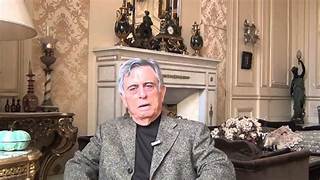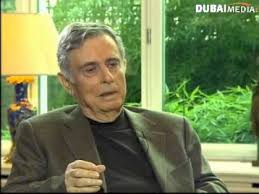Mr. Khaddam: “Syrian army leaders know that the regime is finished”
From Paris, former Syrian Vice President Abdel Halim Khaddam is attempting to unite opposition movements and calls for international intervention.
By Christophe Ayad Published on November 12, 2011
Abdel Halim Khaddam has been living in France since the fall of 2005. It was at this time that the former Syrian Vice President defected, leaving his country and breaking away from the regime of Bashar Al-Assad. At the start of his stay in Paris, he accused, in a televised interview, the Syrian head of state of ordering the assassination of Rafic Hariri, the former Lebanese prime minister killed in a bombing on February 14, 2005. However, since the election of Nicolas Sarkozy, who decided in 2007 to restore relations with Mr. Assad’s Syria, contrary to the policy of Jacques Chirac, Abdel Halim Khaddam had been subject to strict silence.
Times have changed, and Paris, at the forefront of denouncing atrocities in Syria, has lifted all restrictions on him. This week, Mr. Khaddam broke his silence, giving numerous statements. A further sign of France’s change in stance towards him: police protection in front of his luxurious home in the 16th arrondissement of Paris, where he met with Le Monde, has been significantly increased.
Mr. Khaddam’s entry into the scene, at 79 years old, is bad news for both the Syrian regime and the opposition. He is a man who knows the intricacies of the Ba’athist power, having served it for thirty-five years, first under Hafez Al-Assad and then under his son Bashar. Mr. Khaddam, who knows the regime from within and deems it “irreformable,” still maintains contacts, particularly in the Ba’ath Party. “The army has been deployed across the country for nine months, and the officers are exhausted. I receive information,” he explains, “about the concerns of the army’s leaders. They know that the regime is finished and are wondering where all this fierce repression will lead. They are increasingly asking themselves why they should tie their fate to the Assad family. Bashar (Al-Assad) is worried; he doesn’t spend two nights in the same place,” Mr. Khaddam assures.
“IT IS BASHAR AL-ASSAD WHO DECIDES EVERYTHING” For him, power in Syria is exercised by a handful of men: “It is Bashar Al-Assad who decides everything. He is assisted by his brother Maher, his cousin Rami Makhlouf, and a handful of intelligence officers, all from the Alawite community. All the others are executors, assistants, or propagandists, governed by fear. The Ba’ath is useless by now. But like all totalitarian regimes, the Syrian regime is less solid than it seems.”
The former vice president, who long led his country’s foreign policy under Hafez Al-Assad (1970-2000), has a wide international address book, and notably maintains contacts in Saudi Arabia. He also says he is in indirect contact with the leaders of the Free Syrian Army, which consists of deserters and carries out ambushes against security forces and the shabiha (regime militias) inside the country. However, for him, Syria has not yet entered “a civil war.”
His profile as a former Ba’athist may encourage some regime officials to distance themselves. Especially since Mr. Khaddam asserts he wants to do everything to “preserve the Syrian state, unlike what happened in Iraq, where the dismantling of the state, the Ba’ath Party, the army, and institutions led to chaos and massacres.” But Abdel Halim Khaddam’s past, having served without protest for three and a half decades under the Assad dictatorship, does not fail to provoke sarcasm and mistrust within the Syrian opposition. “I regret having participated in this regime,” he pleads, “and whenever I think about it, I can’t help but feel uneasy. But I dealt with foreign policy, not internal affairs. If I have harmed a single Syrian citizen, I am ready to answer for it before the courts.”
It remains that Mr. Khaddam’s appearance further complicates the situation for an opposition already divided. The former high-ranking official indeed sponsors the National Council to Support the Syrian Revolution, whose creation was announced in Paris on Monday, November 7. It is yet another structure, adding to the National Syrian Council (CNS), the most representative body chaired by Burhan Ghalioun, a respected academic living in France, and the National Coordination Committee for Democratic Change, based in Syria. While the CNS advocates for the downfall of the regime and “international protection” for the Syrian people, the National Coordination Committee continues to want dialogue with the regime and rejects any foreign interference.
THE SHADOW OF IRAN What does the National Council to Support the Syrian Revolution, launched by Mr. Khaddam, bring new? He insists that this structure is “at the service of the revolution” and aims to “unify the various currents of opposition,” but he does not fail to criticize the CNS for being “dominated by the Muslim Brotherhood.” This remark is particularly sharp when recalling that Mr. Khaddam had allied with the Muslim Brotherhood in 2006 in order to overthrow the Damascus regime, before they distanced themselves.
The structure founded by Mr. Khaddam calls for “foreign military intervention, the only way to end the bloodshed and quickly defeat the regime.” This maximalist position resonates with the demands of the protesters, particularly in the martyr city of Homs, exhausted by the massacres and repression that have led to over 3,500 deaths in Syria, according to the United Nations. However, the question of military intervention remains explosive within the opposition.
For Mr. Khaddam, the issue extends far beyond Syrian borders: “If the West abandons Syria to Bashar Al-Assad and his Iranian allies, it will bear the responsibility for Iranian domination over the entire region, from Iraq to Lebanon, the Palestinian territories, and even the Gulf, where Tehran maintains sleeper agents. Then, Iran will dominate most of the world’s oil reserves and will be able to dictate prices,” he warns.


